I firmly believe that every person in the whole world has a distinct person that they idolize. That one person whom you would go back in time to meet. My personal idol is the late American composer and conductor, Leonard Bernstein. In the wake of the ‘Bernstein at 100’ celebration in 2018, I have decided that it is appropriate to write a tribute to his memory to give him due credit for his innumerable accomplishments. Not only was he “one of the most prodigiously talented and successful musicians in American history,” he was also a major innovator. His life’s work left a clear and profound impact on the entire world of music, representing the bridge between the styles of old and new. In this way, he was one of the most important musical figures of all time, but also one of the least well-known. I believe that students OA can learn a lot about the history of music through his life story, hence why I have chosen to write this article.
Early Years
Leonard Bernstein was born on August 25th, 1918 in Lawrence, MA, making him some semblance of a local folk hero. His father, Sam Bernstein, owned a small hairstyling business in downtown Lawrence for most of Leonard’s adult life. As a child, it was apparent that young Lenny had a rare, innate musical talent which translated into a love for the piano. This put him in direct conflict with his father. Sam Bernstein believed that classical music was no profession to rely upon. However, he eventually caved and allowed his son to continue with his passion. Leonard eventually took his talents to Harvard for advanced musical study. Sam Bernstein later admitted of his son, “‘Every genius had a handicap. Beethoven was deaf. Chopin had tuberculosis. Well, someday the books will say, ‘Leonard Bernstein had a father’.”
Studying under some of the biggest names in music during his Harvard years, Bernstein honed both his skills as a pianist and as a composer. After graduating in 1939, he chose to enroll at the Curtis Music Institute for further study. To illustrate just how talented Bernstein was, his dean at Curtis, Fritz Reiner, claimed that Bernstein was the first student to whom he ever awarded an ‘A.’
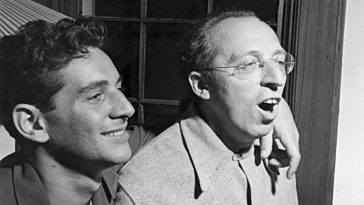
The Developmental Stage
There is little doubt that Bernstein’s enrollment at Harvard and Curtis put him on a collision course with some of the most famous musicians of the era. His skills in both playing and composition put him on the radar of Aaron Copland, arguably the last of history’s most famous composers, with whom Bernstein became a lifelong friend. Ultimately, his connection with Copland proved to be critical to the success of his career. In 1940, he was appointed as a conducting student at Tanglewood in Boston, under the direction of Serge Koussevitsky. Bernstein’s friendship with Koussevitsky was simply another connection that proved invaluable in the long run. At this time, Leonard had moved to New York City, struggling to find work. He spent his days conducting Broadway musicals and cataloguing sheet music. However, his blockbuster opportunity was right around the corner.
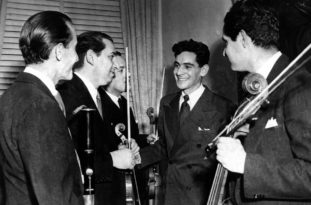
Rise to Fame
The one day that can be looked back to as Bernstein’s leap to fame would be November 14th, 1943, his professional orchestral debut. Owing to all of his talent, hard work, and musical connections, Bernstein was awarded the position of assistant conductor with the New York Philharmonic Orchestra. And, on the aforementioned date, he was cast into a position of leadership. That day, the orchestra’s guest conductor, Bruno Walter (whom was scheduled to conduct at 3 PM) fell ill, requiring Bernstein to substitute. The concert was to be held at Carnegie Hall in New York City. In those days, a 3 PM New York Phil. concert was considered ‘music prime time.’ It was when everyone serious about music tuned into the radio to hear the orchestra perform. As a result, Bernstein’s debut was set to be a widely publicized event with listeners from all across the United States.
Bernstein acknowledged that his debut was the most nervous he had ever felt. The orchestra had no time to prepare a rehearsal, leaving the success of the concert completely on his shoulders. The most remarkable fact about the November 14th concert is that Bernstein was only 25 years old at the time. To put it into perspective, back in those days, a conductor was considered young when he was in his 40s. This disparity was unprecedented and made Bernstein’s debut that much more of a special event. “I remember walking on the stage, white as a sheet I’m sure…I [also] remember the groan of the audience when the manager announced that Bruno Walter was ill,” he remarked in a 1970s interview.
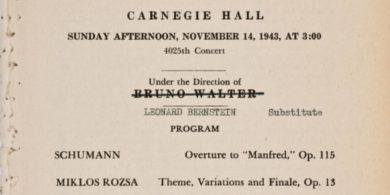
However, the concert was successful. Bernstein’s talents and skills as a young conductor paid off in the biggest moment of his career. The music was met with a standing ovation and he was featured on the front page of newspapers the following day. And then, just like that, Leonard Bernstein became a famous musician. The audio recording of his 1943 debut can still be heard today on Youtube; The link is in the repository below. After that moment, the offers came flooding in. By 1950, Bernstein had already earned a position as the music director of the New York City Symphony, succeeding Leopold Stokowski. He was also offered several opportunities to guest conduct in Europe. All the while, he continued to write his own ballets and symphonies. As a side comparison, Bernstein was the musical equivalent of Sean McVay in the modern day NFL. He was the flashy young leader who brought swagger to every orchestra he lead. By the mid-1950s, Bernstein was fully appointed as Music Director of the New York Philharmonic, a post he would hold from 1957-1969. Over the course of his prime years, he became the first American ‘superstar’ conductor. The only other musician that earned even close to the same amount of respect as Bernstein was the Austrian conductor, Herbert von Karajan, who ruled the European orchestras at the time.
Musical Accomplishments
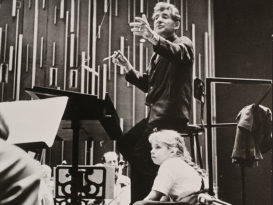
One of the biggest takeaways from Bernstein’s life was that he never stopped caring. He kept himself involved for his entire adult life, leaving behind one of the greatest and impactful musical legacies in all of history. Once he firmly established himself as a stalwart in the musical world, his achievements began to pile on. Throughout the ‘50s and ‘60s, he conducted and composed for orchestras all across the world. One of Bernstein’s innovations that was the most radical was the interpretive freedom he expressed with the orchestras he conducted. In other words, he often rejected the conventional methods of preparing a musical piece. Instead, Bernstein had his orchestras interpret music based on the way he felt that the composer intended. Perhaps a certain longer note here, or a louder section there, whatever the case may have been. It sounds remarkably simple, but in reality it was remarkably radical. Bernstein continued to push the limits of what was considered musically appropriate, which only expanded his profile more and more. With the expansion of technology, he also chose to record a great deal of the music that he produced with his orchestras, another unprecedented behavior. Most of these recordings can still be found on Youtube today. Some of my personal favorites are listed in the repository below.
The central reason as to why Bernstein became the first American ‘superconductor’ was because he had such a vast resumé to his name. Below I have compiled a very brief list some of his most notable accomplishments:
- Music Director of the NY Phil. for 12 years
- Writing over 70 pieces of music, including the scores to West Side Story and Peter Pan
- Recording hundreds of musical works (including many of Beethoven, Tchaikovsky, Mahler, Shostakovich, and countless more)
- Earning a Grammy Award
- Conducting with orchestras all over the world (London Symphony, Vienna Philharmonic, Bavarian Radio Symphony, among many others)
- Introducing the Young People’s Concerts in New York, the longest-running series of family concerts in American history
- Conducting the “Berlin Celebration Concert” after the fall of the Berlin Wall in 1989
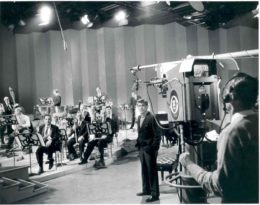
Needless to say, Bernstein left his mark on the musical world in a gargantuan way, clearly altering the course of musical history. According to Oliver Ames Orchestra Director, Michael Korn, Leonard Bernstein was “Absolutely phenomenal; The greatest musician in American history.” Additionally, Ryan Murphy, Oliver Ames Senior cellist, said of Bernstein: “He was undoubtedly one of the most prolific American musicians of all time.” Leonard Bernstein passed away on October 14th, 1990 at age 72 after a long battle with emphysema and other lung issues due to his smoking.
A Tribute to Leonard Bernstein
1918-1990
Link Repository:
Handel’s Messiah (1955 recording)
New York Philharmonic Young People’s Concerts
